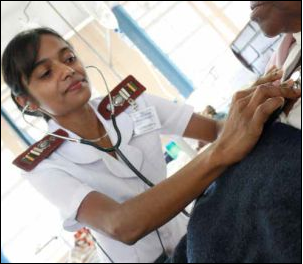Residents of KwaZulu- Natal are enjoying the benefits of three National Health Insurance (NHI) pilot sites in the province, which have brought a noticeable improvement in health care.
 The NHI is a financing system that will make sure all South Africans get essential healthcare, regardless of how much they earn.
The NHI is a financing system that will make sure all South Africans get essential healthcare, regardless of how much they earn.
The roll out of the NHI is expected to take about 14 years.
As part of the first phase, in 2012, 11 pilot districts were identified to test the feasibility of the NHI.
Recently, KwaZulu-Natal Health MEC Sibongiseni Dhlomo gave an update on the progress of NHI at one of the province’s pilot districts, Amajuba, where the R13 million Ingongo Clinic in Newcastle was opened.
MEC Dhlomo said the department had provided mobile pharmacy services so that chronic patients would be able to collect their medication in the district as part of the NHI. “Three doctors are currently providing medical services at five clinics in this district, with another one contracted through a supporting non-governmental organisation partner.
“School health teams were appointed and Dashni Sheik, a nurse at Edendale Hospital in KwaZulu-Natal, is witnessing first hand the benefits on the National Health Insurance. pregnant. They easily die … due to issues like hypertension.”
However, the Minister pointed out that the new device was not only targeted at young girls, but married women, who are advised by their doctors not to fall pregnant again, following previous pregnancy-related complications. Once inserted, the device is effective for three years. “You no longer have to go to the hospital every three months, you’ll now go after three years. But if you want to have a baby before three years, you just come and ask us to remove it,” said Minister Motsoaledi.
Monyeni plans to educate her family about the new contraceptive device. “I have younger sisters and both of them have children, I will also advise them to get the device.”
She added that government had done a good thing by making the contraceptive device freely available but it should also be rolled out to high schools, given the high number of teenage pregnancies.
Sister Rebecca Mokoma, who is a nurse at the Laudium Community Health Centre, said the device was becoming popular with residents of Atteridgeville, Erasmia, Mooiplaas, Olievenhoutbosch and other areas. The clinic services 360 000 people from these areas.
“On an average day we get about 10 people between the ages of 30 and 35 coming for the device. Some say they heard about it from the media or through word of mouth.” She added that before the device is implanted patients are screened for breast cancer and pregnancy.
“We give the device to girls from the age of 14 years upward. The patients who come back for follow up visits say they only have minimal side effects such as nausea and dizziness, which only lasts for two weeks after the implants.”
The clinic has five nurses and one doctor trained to insert the contraceptive device. Countrywide, 2 000 nurses have been trained to administer the device, the Minister said.
New contraceptive device welcomed are currently covering 4 232 Grade 1 learners in 98 schools.”
The MEC added that his department had appointed district clinical specialist teams to cover all primary health care clinics and hospitals in the district.
Another district to which the NHI has brought change is the uMgungundlovu District. Edendale Hospital, near Pietermaritzburg, falls under this district.
Dashni Sheik is a nurse here and is the hospital’s resuscitation coordinator. Her role is to ensure the hospital’s 47 wards all have resuscitation trolleys.
A resuscitation trolley has all the equipment needed to resuscitate or perform cardiopulmonary resuscitation (CPR), an emergency procedure to restore blood circulation and breathing. “Before the NHI was piloted some wards in the hospital, such as physiotherapy did not have a resuscitation trolley. This is all new and part of the NHI,” she said.
Sheik, who has been a nurse for 16 years, added that South Africa is moving in the right direction with health care.
She has seen a number of changes at the hospital, since it became part of the NHI pilot programme.
The hospital is cleaner, security is tighter, while queues and waiting times are shorter after the hospital hired queue marshals. Pensioner Thandi Mkhize from KwaDambuza, a patient awaiting surgery, agrees with Sheik.
“I have lived in this area all my life. I have seen Edendale Hospital at its lowest with long queues and low levels of cleanliness. There has been huge change. I didn’t have to wait long to be admitted. The queues move faster and medicine is always available,” said Mkhize. Initially the Department of Health selected 10 NHI pilot sites, with KwaZulu-Natal allocated two in uMgungundlovu and uMzinyathi. The provincial department then added a third site, Amajuba, and is carrying the cost of this site. These efforts have seen the facilities at the hospital improve, with the opening of the Communicable Disease Clinic (CDC), which cost over R41 million.
The new clinic has an ARV pharmacy, consultation rooms, counselling rooms, coughing booth and a special waiting area for clients.
The CDC provides management in HIV, TB and sexually transmitted infections, as well as cervical cancer screening, health screening, pharmacy services, social work services and diet services.
Sheik explained that the hospital also revamped its emergency department and opened a psychiatric department, which needed to be at the same as level as that of private hospitals.
The hospital also has more equipment and staff.
According to the Twenty Year Review released by Presidency, since 1994, 1 500 health facilities were built.
The review adds that implementing the NHI would reduce the costs of private health care, improve the quality of health infrastructure and services, as well as strengthen and expand primary health care services.



 Facebook
Facebook Twitter
Twitter WhatsApp
WhatsApp